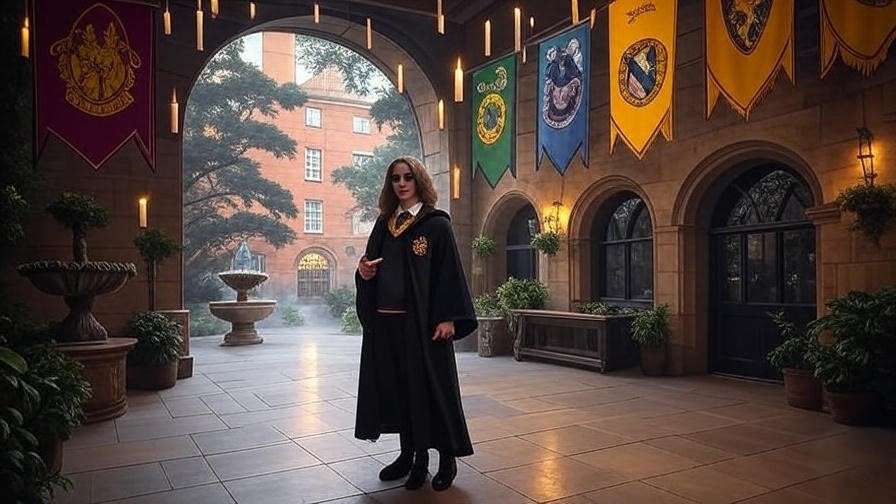Picture yourself in the Hogwarts library, surrounded by towering shelves of spellbooks, the faint glow of enchanted candles, and the whisper of turning pages. As you embark on your wizards study journey, the path to mastering magic feels both thrilling and daunting. Whether you’re a Harry Potter fan dreaming of acing your O.W.L.s or a student seeking real-world study strategies, the secrets of Hogwarts’ brightest minds can transform your approach to learning. Inspired by the disciplined study habits of Hermione Granger, the resilience of Harry Potter, and the wisdom of Ravenclaw’s scholars, this article unveils seven proven techniques to help you study like a wizard. Backed by learning science and infused with magical charm, these strategies will empower you to conquer any subject with Hogwarts-level mastery.
As a lifelong Harry Potter enthusiast and study skills expert, I’ve spent years analyzing the series’ themes and applying them to effective learning strategies. The wizarding world offers more than entertainment—it’s a treasure trove of inspiration for focus, discipline, and creativity. Whether you’re tackling complex potions or calculus, these techniques blend magical metaphors with practical advice to address the real-world challenge of studying effectively. Let’s dive into the enchanted art of learning and unlock your inner wizard.
Why Studying Like a Wizard Matters
The Challenges of Mastering Magic
In the wizarding world, mastering magic is no small feat. Subjects like Transfiguration, Potions, and Defense Against the Dark Arts demand precision, practice, and perseverance—qualities that mirror the challenges of academic or creative pursuits in the Muggle world. Just as Hermione struggled with her first Patronus Charm or Harry grappled with Occlumency, students face obstacles like information overload, distractions, and self-doubt. The key to success lies in adopting structured, intentional study habits, much like those honed by Hogwarts’ finest.
The complexity of magical subjects reflects real-world learning struggles. For example, brewing a perfect Polyjuice Potion requires meticulous attention to detail, just as mastering calculus demands understanding intricate concepts. By channeling the focus and resilience of a wizard, you can overcome these hurdles and achieve academic or personal growth.
How Hogwarts Inspires Real-World Success
Hogwarts’ structured approach to education—complete with timetables, house points, and rigorous exams—offers a blueprint for effective learning. Hermione’s color-coded schedules and Harry’s practical spell-casting sessions highlight the power of discipline and hands-on practice. These principles align with modern learning science, which emphasizes active engagement and structured planning for retention and mastery.
Expert Insight: Dr. John Hattie, a renowned education researcher, notes in his book Visible Learning that “structured teaching and clear goal-setting” significantly boost student outcomes. By adopting Hogwarts-inspired strategies, you can transform your study sessions into magical moments of growth.
Technique 1: Create a Magical Study Environment
Setting Up Your Own Hogwarts Common Room
Your study environment sets the tone for success. Imagine studying in the Gryffindor common room, with its roaring fire and cozy armchairs, or the airy, book-filled Ravenclaw tower. To create your own magical space, start by decluttering your desk and adding personal touches that inspire focus. Choose a quiet corner, away from distractions like smartphones or noisy siblings, and incorporate elements that evoke Hogwarts’ charm.
- Lighting: Use soft, warm lighting to mimic enchanted candles. A desk lamp with a warm bulb works wonders.
- Organization: Keep your study materials neatly arranged, like Hermione’s meticulously organized spellbooks.
- Inspiration: Add a house banner, a Hogwarts crest, or a motivational quote like “Draco Dormiens Nunquam Titillandus” (Never Tickle a Sleeping Dragon).

Using Magical Ambiance for Focus
Ambiance can elevate your focus to wizarding levels. Try playing Hogwarts-inspired ambient sounds, such as crackling fires, quill scratches, or the hum of the Great Hall. Websites like Ambient-Mixer.com offer free Harry Potter-themed soundscapes that transport you to the wizarding world. Pair these with noise-canceling headphones to block out Muggle distractions.
Example: Search for “Hogwarts Library Ambience” on YouTube or Ambient-Mixer.com to find free soundtracks that enhance concentration. One study from the University of Southern California found that ambient sounds can improve focus by up to 20% for tasks requiring deep concentration.
Tip: Hang a DIY house banner (Gryffindor, Slytherin, Hufflepuff, or Ravenclaw) above your desk to channel your chosen house’s energy.
Technique 2: Master Time-Turner Scheduling
Planning Like Hermione Granger
Hermione’s use of the Time-Turner in Harry Potter and the Prisoner of Azkaban showcases her mastery of time management. While Muggles can’t bend time, you can adopt her disciplined scheduling to juggle tasks effectively. Start by using a planner or digital app like Notion or Google Calendar to map out your study sessions.
- Pomodoro Technique: Work in 25-minute bursts (a “Time-Turner cycle”) followed by 5-minute breaks to maintain focus.
- Block Scheduling: Assign specific subjects to time slots, like Charms from 10:00–11:00 AM and Potions from 11:15–12:15 PM.

Example: Below is a sample weekly schedule inspired by Hermione’s O.W.L. prep:
| Time | Monday | Tuesday |
|---|---|---|
| 9:00–10:00 | Transfiguration (Math) | Potions (Chemistry) |
| 10:15–11:15 | Charms (English) | Herbology (Biology) |
| 11:30–12:30 | Break (Hogsmeade Snack) | Break (Quidditch Practice) |
Prioritizing Tasks with a Wizard’s Precision
Not all tasks are equal—some are as critical as casting a Patronus, while others are like practicing basic wand movements. Use the Eisenhower Matrix to prioritize:
- Urgent and Important: Study for upcoming exams (e.g., O.W.L.s or midterms).
- Important but Not Urgent: Review notes or practice skills for long-term mastery.
- Less Critical: Organize study materials or explore supplementary topics.
Expert Insight: Productivity expert David Allen, author of Getting Things Done, emphasizes prioritizing tasks to “free mental space for creative thinking.” By focusing on high-impact tasks, you’ll study smarter, not harder.
Technique 3: Brew Notes Like a Potions Master
The Art of Note-Taking, Snape-Style
Severus Snape’s precision in potion-making reflects the importance of detailed, organized note-taking. Effective notes are like a well-brewed potion—clear, concise, and potent. Try the Cornell Note-Taking System, which divides your page into cues, notes, and a summary section, or use mind-mapping to connect ideas visually.
- Cornell Method: Write key points in the main section, questions or keywords in the cue column, and a summary at the bottom.
- Mind-Mapping: Create a “spellbook” diagram with a central topic (e.g., Potions) and branches for subtopics (e.g., ingredients, brewing steps).

Reviewing Notes with a Memory Charm
To retain information like a Memory Charm, use active recall and spaced repetition. Active recall involves testing yourself on key concepts, while spaced repetition schedules reviews over increasing intervals (e.g., 1 day, 3 days, 1 week). Create a “Pensieve” for your notes by summarizing key points in a dedicated notebook or digital app.
Example: To memorize potion ingredients, write flashcards with the ingredient on one side and its use on the other (e.g., “Lacewing Flies: Used in Polyjuice Potion”). Review these daily, then weekly, to lock in knowledge.
Tip: Use color-coded pens to categorize notes—red for key concepts, blue for examples, and green for questions.
Technique 4: Practice Spells Through Active Learning
Casting Spells with Hands-On Practice
In the wizarding world, mastering a spell like Expecto Patronum requires more than reading a spellbook—it demands hands-on practice. Similarly, active learning techniques, such as teaching, quizzing, or role-playing, help you internalize complex concepts. Harry Potter’s relentless practice of the Patronus Charm under Lupin’s guidance shows the power of active engagement. Instead of passively rereading notes, test yourself, explain concepts aloud, or apply them in real-world scenarios.
- Self-Quizzing: Create flashcards or use apps like Quizlet to test your knowledge on topics like Charms or calculus.
- Teach Back: Pretend to teach a spell (or concept) to a friend, which reinforces understanding through explanation.
- Role-Playing: Simulate a Hogwarts exam by practicing under timed conditions, mimicking the pressure of an O.W.L.
Example: To master a tricky topic like algebraic equations, solve practice problems and explain each step as if you’re instructing a first-year Hogwarts student. This mirrors Harry’s methodical practice to summon his Patronus.
Group Study Like the DA (Dumbledore’s Army)
Harry’s leadership in Dumbledore’s Army (Harry Potter and the Order of the Phoenix) highlights the value of collaborative learning. Studying with peers, like the DA practicing defensive spells, fosters accountability and diverse perspectives. Form a study group with friends or join online communities, such as Reddit’s r/harrypotter, to discuss and practice concepts.

- Structure Group Sessions: Assign roles (e.g., note-taker, quizmaster) and focus on specific topics, like Potions or history.
- Leverage Online Communities: Engage in Harry Potter fan forums or study-focused Discord servers to share tips and motivation.
Expert Insight: A 2019 study in Learning and Instruction found that collaborative learning improves retention by 15–20% compared to solo study, as it encourages discussion and problem-solving.
Technique 5: Channel Your Inner Ravenclaw with Critical Thinking
Asking “Why” Like Luna Lovegood
Ravenclaw’s emphasis on intellect and curiosity, embodied by Luna Lovegood’s unconventional questions, inspires critical thinking. To study like a Ravenclaw, dig deeper into concepts by asking “why” and “how.” The Feynman Technique is perfect for this: explain a topic in simple terms, as if teaching it to a child, to uncover gaps in understanding.
- Steps of the Feynman Technique:
- Write the concept (e.g., “Transfiguration Laws” or “Newton’s Laws”).
- Explain it in plain language.
- Identify areas of confusion and research them.
- Simplify further and create analogies (e.g., Transfiguration is like reshaping clay).
Example: To understand a complex spell like Aguamenti, break it down: Why does it produce water? How does wand movement affect it? This mirrors Luna’s curiosity about Nargles, driving deeper insight.
Solving Problems Like a Magical Puzzle
The Triwizard Tournament’s challenges, like decoding the golden egg’s clue, showcase problem-solving through critical thinking. Apply this to your studies by breaking complex topics into manageable parts. For instance, if studying history, create a timeline of events (like the Goblin Rebellions) and analyze cause-and-effect relationships.

- Practical Exercise: Choose a topic (e.g., Potions or biology). List its core components, then write one question for each to explore deeper (e.g., “Why does adding asphodel change a potion’s effect?”).
Tip: Keep a “Magical Questions Journal” to jot down curiosities during study sessions, fostering a Ravenclaw-like love for learning.
Technique 6: Stay Motivated with a Gryffindor’s Courage
Overcoming Study Obstacles Like Harry Potter
Harry’s courage in facing Voldemort mirrors the grit needed to overcome study challenges. Procrastination, self-doubt, and burnout are like Dementors—they drain your motivation. Combat them with a Gryffindor’s bravery by setting clear goals and tackling obstacles head-on.
- Beat Procrastination: Break tasks into small, actionable steps (e.g., “Read one chapter” instead of “Study Potions”).
- Address Self-Doubt: Reflect on past successes, like Harry recalling his Quidditch wins to boost confidence before a challenge.
- Manage Burnout: Take short breaks every 90 minutes to recharge, as recommended by productivity studies.

Example: If you’re dreading a tough subject like Arithmancy (or math), start with one problem and reward yourself with a small treat, like a Chocolate Frog-inspired snack.
Rewarding Progress Like a House Cup Victory
Hogwarts’ House Cup system motivates students through rewards, and you can do the same. Celebrate milestones, such as completing a study session or acing a quiz, with rewards that spark joy.
- Small Rewards: Enjoy a cup of tea, a favorite song, or a short walk after a focused study block.
- Big Rewards: After a major milestone (e.g., finishing a project), treat yourself to a Harry Potter movie night or a themed dessert.
Example: Create a “House Points” system: Earn 10 points per study hour, and at 100 points, reward yourself with a Butterbeer-inspired drink (try a non-alcoholic recipe online).
Expert Insight: Psychologist Dr. Carol Dweck, author of Mindset, emphasizes that rewarding effort fosters a growth mindset, encouraging persistence in challenging tasks.
Technique 7: Rest and Recharge Like a Hufflepuff
The Importance of Balance in the Wizarding World
Hufflepuff’s focus on community and well-being reminds us that rest is crucial for sustainable studying. Just as Hogwarts students unwind at Hogsmeade, you need breaks to maintain mental clarity. Sleep, relaxation, and self-care are scientifically proven to enhance memory and focus.
- Sleep: Aim for 7–9 hours nightly, as studies show sleep consolidates learning.
- Breaks: Follow the 50/10 rule—50 minutes of study, 10 minutes of rest—to prevent fatigue.
- Self-Care: Practice mindfulness or light exercise to reduce stress.
Example: After a long study session, take a “Hogsmeade Break” with a 10-minute walk or a relaxing activity like journaling.
Magical Rituals for Relaxation
Incorporate Hogwarts-inspired relaxation rituals to recharge. Picture meditating by the Black Lake or sipping tea in the Hufflepuff common room. Try this 5-minute guided relaxation script:
- Sit comfortably and close your eyes.
- Imagine walking through Hogwarts’ grounds, hearing the rustle of leaves.
- Breathe deeply, counting to four on each inhale and exhale.
- Visualize a calming spell, like Lumos, filling you with warmth.
- Open your eyes, refreshed and ready to study.

Tip: Schedule “Hogsmeade Breaks” in your planner to ensure guilt-free relaxation.
Expert Insight: A 2021 study in Nature found that mindfulness practices improve focus and reduce anxiety, making them ideal for students.
Common Mistakes to Avoid in Your Wizards Study Journey
Overloading Like an Overzealous First-Year
First-years at Hogwarts often bite off more than they can chew, like trying to master Wingardium Leviosa and Expelliarmus in one day. Avoid cramming or overloading your schedule, as it leads to burnout. Instead, focus on one or two key topics per session, ensuring deep understanding.
Neglecting Practical Application
Reading about spells without practicing them is like Ron mispronouncing “Wingardium Leviosa.” Apply your knowledge through practice problems, discussions, or projects to solidify learning.
Example: If studying Herbology (or biology), don’t just read about plants—sketch them, label their parts, or quiz yourself on their properties.
Tools and Resources for Aspiring Wizards
Magical Study Apps and Tools
To study like a Hogwarts prodigy, leverage modern tools with a magical twist. Apps and resources can streamline your wizards study journey, helping you organize, practice, and stay motivated. Here are some top picks inspired by the wizarding world:
- Notion: Create a digital “spellbook” to organize notes, schedules, and study plans, much like Hermione’s meticulous planners. Use templates to mimic Hogwarts timetables or track O.W.L.-style goals.
- Quizlet: Build flashcard decks for spell-like memorization, perfect for mastering potion ingredients or historical dates. Search for Harry Potter-themed sets for extra fun.
- Forest: A productivity app that gamifies focus, letting you grow virtual trees during study sessions—a Muggle equivalent of earning House Points.
- Ambient Sound Apps: Use apps like MyNoise or websites like Ambient-Mixer.com for Hogwarts-inspired soundscapes, such as “Slytherin Common Room” or “Hogwarts Library,” to enhance concentration.
Example: Download a Notion template titled “Hogwarts Study Planner” from online communities or create your own with sections for Charms, Potions, and revision schedules. Pair it with a Gryffindor-themed background for inspiration.
Books and Communities for Hogwarts Fans
The Harry Potter universe offers a wealth of inspiration for studying. Beyond J.K. Rowling’s books, explore companion guides and fan communities to fuel your wizards study motivation:
- Books: Read The Tales of Beedle the Bard or Quidditch Through the Ages for light, motivational breaks that keep you immersed in the wizarding world. For study skills, try Make It Stick by Peter C. Brown for evidence-based learning strategies.
- Communities: Join Reddit’s r/harrypotter or the Harry Potter Amino app to connect with fans who share study tips or role-play Hogwarts scenarios. These communities often host discussions on magical learning techniques.
- Fan-Made Resources: Websites like MuggleNet or the Harry Potter Wiki offer detailed breakdowns of magical subjects, which can inspire creative study approaches.
Example: Engage in a Reddit thread titled “How Would Hermione Study for Muggle Exams?” to gather ideas from fans and adapt them to your own study routine.
FAQs About Studying Like a Wizard
How Can I Stay Focused When Studying Feels Overwhelming?
Overwhelm is common, whether you’re facing a mountain of spellbooks or a hefty textbook. Create a Hogwarts-inspired environment to boost focus—think soft lighting, ambient sounds, and a clutter-free desk. Break tasks into smaller, spell-like steps (e.g., “Master one formula” instead of “Learn all of calculus”). Use the Pomodoro Technique to maintain momentum without burnout.
What’s the Best Way to Memorize Complex Information, Like Potion Ingredients?
Mimic a Memory Charm with active recall and spaced repetition. Create flashcards with key details (e.g., “Bezoar: Antidote to most poisons”) and review them regularly. Visualize a cauldron bubbling with ingredients to make memorization vivid. Apps like Anki or Quizlet can automate spaced repetition for efficiency.
How Do I Balance Studying with Other Responsibilities?
Channel Hermione’s Time-Turner scheduling by prioritizing tasks and setting boundaries. Use a planner to allocate specific times for studying, work, and relaxation. Incorporate Hufflepuff-inspired self-care, like short walks or mindfulness, to maintain balance. Communicate with family or roommates to carve out uninterrupted study time.
Can These Techniques Help with Non-Academic Goals, Like Learning a New Skill?
Absolutely! Whether you’re learning Quidditch moves or a new language, these techniques apply. Active learning (Technique 4) helps with skills like music or coding, while critical thinking (Technique 5) aids problem-solving in creative pursuits. Adapt the strategies to your goal—e.g., treat guitar chords like spells to practice daily.
Mastering your studies, like mastering magic at Hogwarts, requires dedication, strategy, and a sprinkle of wizardly inspiration. By adopting these seven proven techniques—creating a magical study environment, scheduling like a Time-Turner pro, taking notes like a Potions Master, practicing actively, thinking critically like a Ravenclaw, staying motivated with Gryffindor courage, and recharging with Hufflepuff balance—you can unlock your full potential. These methods blend the enchanting lessons of Harry Potter with evidence-based learning science, offering practical solutions for students, fans, and lifelong learners.
Avoid common pitfalls like overloading your schedule or neglecting practice, and leverage tools like Notion, Quizlet, and Hogwarts-inspired communities to stay on track. Whether you’re preparing for exams, pursuing a passion, or simply dreaming of acing your O.W.L.s, these wizards study secrets will guide you to success. So grab your metaphorical wand, channel your inner Hermione, and start studying like a Hogwarts pro today.













